| Srl | Item |
| 1 |
ID:
052407
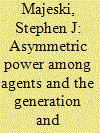

|
|
|
|
|
| Publication |
June 2004.
|
| Summary/Abstract |
The question addressed in this analysis is whether endowing agents with various forms of asymmetric power makes cooperation more likely across a variety of structural settings of conflict and cooperation present in international relations. To address this question, an agent-based model incorporating asymmetric power among agents in a set of (2 2) games that represent different forms of conflict and cooperation prevalent in international relations (Chicken, Stag, Assurance, Deadlock, and Prisoner's Dilemma) is developed and analyzed via simulation. Simulation results indicate that the introduction of asymmetric power substantially increases the chances that both cooperative agents survive and cooperative worlds evolve. This is particularly the case when agents are endowed with the ability to selectively interact with other agents. Also, anticipated variations in outcomes across the game structures regarding the likelihood of cooperation are supported.
|
|
|
|
|
|
|
|
|
|
|
|
|
|
|
|
| 2 |
ID:
141361
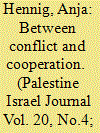

|
|
|
|
|
| Summary/Abstract |
In Europe, the traditional churches (still) enjoy a privileged position vis-á-vis their cooperative relationship with the state.
|
|
|
|
|
|
|
|
|
|
|
|
|
|
|
|
| 3 |
ID:
112755


|
|
|
|
|
| Publication |
2012.
|
| Summary/Abstract |
Religion has been used by many scholars as an analytical category and an independent variable to account for the variances in governance and political violence. Very often, religion is decontextualized, resulting in confusions about the character of specific faith traditions. This article suggests an alternative framework by looking at the conceptualization and possible operationalization of the concept of public theology. In cases where "religion" might be conceptually ambivalent, a public theology framework with substantive, spiritual, spatial, and temporal dimensions can provide a sounder theorization of peaceful/violent or exclusive/inclusive strands of faith traditions and the relationship among them. Focusing on manifestations and public understandings instead of the religion itself, it also relieves political analysis from sensitive questions about what religious texts say and how traditions should be represented.
|
|
|
|
|
|
|
|
|
|
|
|
|
|
|
|
| 4 |
ID:
185570


|
|
|
|
|
| Summary/Abstract |
How do disasters influence conflict and diplomacy in conflict areas? The scholarship shows that while they can provide opportunities for cooperation and ‘disaster diplomacy’ between parties to a conflict, they can also intensify tension and hostility. This article uses the Israeli–Palestinian conflict during the COVID-19 pandemic as a case study, exploring the impact of the crisis on relations between the rival parties and examining the conditions under which an ongoing pandemic might lead to either conflict or cooperation in a conflict area. The research is based on within-case analysis, comparing three conflict arenas: Israel–Palestinian Authority relations in the West Bank; relations between Israel and the Palestinian community in East Jerusalem; and Israel–Hamas government relations in the Gaza strip. The article outlines the possibilities and limitations of ‘disaster diplomacy’ in intractable conflicts and contributes to the literature by identifying how different contexts, relations and actors in each conflict arena affect the development of patterns of conflict and cooperation with regard to the pandemic. The study analyses the factors that shape how the pandemic affects the conflict, and the COVID-19-related diplomacy, in each sub-case, with attention to three main variables: the structure of the conflict arena, domestic politics and the developments in the pandemic. The analysis addresses the unique conditions of an ongoing global pandemic, as opposed to an isolated disaster event, and traces the changing impact of the pandemic on the conflict and on disaster-related cooperation at various stages.
|
|
|
|
|
|
|
|
|
|
|
|
|
|
|
|
| 5 |
ID:
160913
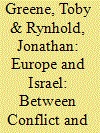

|
|
|
|
|
| Summary/Abstract |
Frustration over right-wing Israeli policies on Palestine has held back the advance of EU–Israel relations, but has not yet led to EU-wide pressure.
|
|
|
|
|
|
|
|
|
|
|
|
|
|
|
|
| 6 |
ID:
145690
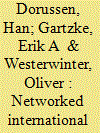

|
|
|
|
|
| Summary/Abstract |
Network theory and methods are becoming increasingly used to study the causes and consequences of conflict. Network analysis allows researchers to develop a better understanding of the causal dynamics and structural geometry of the complex web of interdependencies at work in the onset, incidence, and diffusion of conflict and peace. This issue features new theoretical and empirical research demonstrating how properly accounting for networked interdependencies has profound implications for our understanding of the processes thought to be responsible for the conflict behavior of state and non-state actors. The contributors examine the variation in networks of states and transnational actors to explain outcomes related to international conflict and peace. They highlight how networked interdependencies affect conflict and cooperation in a broad range of areas at the center of international relations scholarship. It is helpful to distinguish between three uses of networks, namely: (1) as theoretical tools, (2) as measurement tools, and (3) as inferential tools. The introduction discusses each of these uses and shows how the contributions rely on one or several of them. Next, Monte Carlo simulations are used to illustrate one of the strengths of network analysis, namely that it helps researchers avoid biased inferences when the data generating process underlying the observed data contains extradyadic interdependencies.
|
|
|
|
|
|
|
|
|
|
|
|
|
|
|
|
| 7 |
ID:
077740
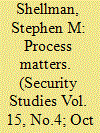

|
|
|
|
|
| Publication |
2006.
|
| Summary/Abstract |
Competing hypotheses on the relationship between government and dissident behavior emerge from both formal and empirical models. Yet, the current literature lacks a comprehensive theoretical account of such contradictory effects. This study develops a theory to account for a large number of competing hypotheses within a single framework. The theory explains various government and dissident tactical choices over the course of an internal political struggle by focusing on leaders, their motivations, and the link between their motivations and actions. The theory gives rise to a process model of sequential government-dissident interactions that is used to test several implied hypotheses. Empirical sequential time-series models of government and dissident behavior find support for most of the theory's implied hypotheses in Israel (1979-2002) and Afghanistan (1990-99).
|
|
|
|
|
|
|
|
|
|
|
|
|
|
|
|
| 8 |
ID:
158792


|
|
|
| 9 |
ID:
137820


|
|
|
|
|
| Summary/Abstract |
Event data is the preferred method of characterizing directed-dyadic behavior through time and is a very versatile approach able to handle both state and nonstate actors. By scaling and aggregating values on a conflict and cooperation continuum, event data can provide a net measure of conflict between two parties for a set time interval. The CAMEO coding scheme was created to address structural flaws in the WEIS coding scheme and to handle better the post-Cold War environment. However, no systematic study has been completed for assigning fixed-weight conflict–cooperation scale values to the newer coding scheme, leaving an ad hoc transliteration of Goldstein scale values for WEIS as the best option. This paper reports the results of a psycho-physical magnitude scaling survey of 158 students from two universities where the students scaled CAMEO categories for conflict and cooperation. In addition to providing empirically based scale values for CAMEO, the paper also tests whether or not conflict and cooperation exist on a single continuum and whether or not a gender difference exists in perceptions of conflict and cooperation.
|
|
|
|
|
|
|
|
|
|
|
|
|
|
|
|
| 10 |
ID:
131262


|
|
|
|
|
| Publication |
2014.
|
| Summary/Abstract |
Recent patterns suggest that states are using economic sanctions more frequently. However, sanctions fail to achieve intended political or economic goals most of the time. To account for this anomaly, I introduce a culture-based explanation. The rationale is that sanction effectiveness cannot be solely judged by norms and standards of sender countries. Target countries' cultural norms play an important role in explaining sanction effectiveness. Using cases of US economic sanctions against China, I show that the norms and beliefs of target countries play an important role in defining sanction effectiveness. The implication of the study is that senders of economic sanctions must take cultural responses and sensitivity of targets into serious consideration in order to deploy credible and successful economic sanctions as a foreign policy tool.
|
|
|
|
|
|
|
|
|
|
|
|
|
|
|
|